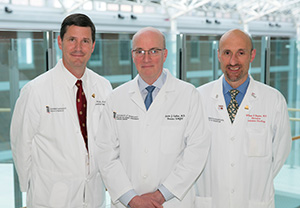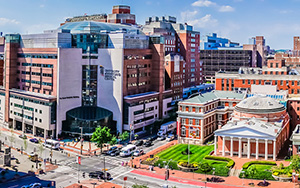Baltimore, Maryland
The University of Maryland Marlene and Stewart Greenebaum Comprehensive Cancer Center (UMGCCC) is one of the top cancer treatment and research centers in the country. In 2016, the National Cancer Institute (NCI) elevated UMGCCC to its designation as a comprehensive cancer center — one of 51 in the nation. Located in Baltimore, Maryland, UMGCCC offers innovative approaches to diagnosing and treating all types of cancer, conducts cutting-edge research to bring the latest advances in cancer treatment directly to patients in Maryland and beyond, and provides cancer screening and patient education services. The cancer center is nationally recognized for its excellence in patient care and multidisciplinary translational research program.
 More than 200 physicians and scientists work together at the cancer center – a joint entity of the University of Maryland Medical Center and the University of Maryland School of Medicine. In recent years, UMGCCC has pioneered advances in cancer treatment, including the development of aromatase inhibitors to treat breast cancer by the late Angela Brodie, PhD; the invention of the GammaPod™, a new radiation treatment option for early-stage breast cancer that can reduce the number of treatments and spare healthy tissue from radiation; and the development of promising new drug compounds and immunotherapies, such as a next-generation chimeric antigen receptor (CAR) T-cell therapy.
More than 200 physicians and scientists work together at the cancer center – a joint entity of the University of Maryland Medical Center and the University of Maryland School of Medicine. In recent years, UMGCCC has pioneered advances in cancer treatment, including the development of aromatase inhibitors to treat breast cancer by the late Angela Brodie, PhD; the invention of the GammaPod™, a new radiation treatment option for early-stage breast cancer that can reduce the number of treatments and spare healthy tissue from radiation; and the development of promising new drug compounds and immunotherapies, such as a next-generation chimeric antigen receptor (CAR) T-cell therapy.
UMGCCC’s comprehensive research programs include: Experimental Therapeutics, Hormone Responsive Cancers, Molecular and Structural Biology, Population Science, and Tumor Immunology and Immunotherapy.
Studies show being treated first at an NCI-designated comprehensive cancer center like UMGCCC improves a patient’s survival.
UMGCCC patients appreciate their access to:
- Doctors who specialize in particular types of cancer, regularly treating even the rarest forms of cancer.
- The highest levels of clinical quality.
- State-of-the-art technology and treatment options.
- Comprehensive patient support services.
- Best quality outcomes.
 UMGCCC traces its origins to 1965, when NCI created an off-campus intramural program in the Division of Cancer Treatment at NCI and located it in the U.S. Public Health Service Hospital (USPHS) in Baltimore. After the USPHS hospitals were closed in 1974, the program was transferred to the University of Maryland. In 1982, the program was moved from a public to a private facility and renamed the University of Maryland Cancer Center, changing in 1996 to the UMGCC. The center received its NCI designation in 2008 and achieved comprehensive status eight years later. To learn more, visit www.umgccc.org.
UMGCCC traces its origins to 1965, when NCI created an off-campus intramural program in the Division of Cancer Treatment at NCI and located it in the U.S. Public Health Service Hospital (USPHS) in Baltimore. After the USPHS hospitals were closed in 1974, the program was transferred to the University of Maryland. In 1982, the program was moved from a public to a private facility and renamed the University of Maryland Cancer Center, changing in 1996 to the UMGCC. The center received its NCI designation in 2008 and achieved comprehensive status eight years later. To learn more, visit www.umgccc.org.


Subscribe to the Big Ten CRC Newsletter X
X Facebook
Facebook YouTube
YouTube